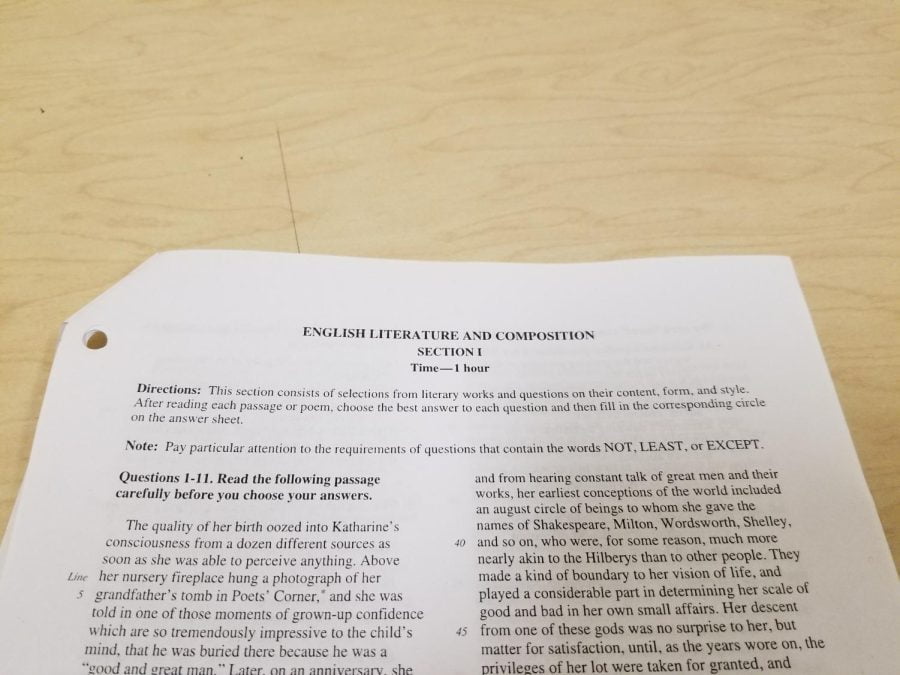How to Study for the AP Test
If you decided to challenge yourself this school year and took AP class(es), the tests are just around the corner. The first time taking one of these tests can be nerve-racking, or even if it’s your fifth time. However, preparing yourself to the best of your ability can help quell these emotions.
MC
If, for some reason, your teacher(s) haven’t started doing multiple choice with you, I would suggest printing off a multiple choice section from AP Students, the College Board. At the very least, practice on the website. The only thing you lose if you complete this online is practicing the act of annotating, physically crossing out wrong answers, and circling key words, etc. However, these skills are essential to performing well on many tests.
As many juniors and seniors may know from taking the ACT, a good test taking strategy is to fully cross out all answers that are wrong. Many times only part of the answer will be false. This my friends makes the entire option wrong, so take that number two pencil and scratch away.
It is important to read carefully, as my ACT prep book taught me, reading a question slowly once is more time conducive than reading it multiple times. Also, if you read the question over and over because you are confused, it often makes you frustrated. Then, if you become frustrated, you easily become stressed, which, surprise surprise, those two emotions aren’t good for taking the rest of the test. So, please do yourself a favor and read. Slowly. And carefully. Just because you’re reading slowly doesn’t mean your mind is as engaged as it needs to be to perform at its best. Did the passage even have x? No? Then whatever that option said about x can’t be true, even if it is somewhere in the passage; it’s just not related to x.
Please do not be afraid to mark up your test booklet! The scantron, or the bubble sheet, is the only thing you will be graded on. No one besides yourself will see your booklet, so make all the notes and circles you want. Personally, I find underlining and circling important information and words helpful.
Now, if I’ve stressed you out, don’t worry. Easier said than done, I know, but this is what practice is all about. Practicing helps you know what to expect and how to go about the test.
Find a strategy that works for you and then stick with it. On an English exam do you prefer reading the questions first and then reading the passage, or vice versa? On a math test do you easily run out of time and should skip problems you aren’t immediately sure how to solve? Just like with the ACT, you aren’t punished for guessing. Mark your favorite letter of A, B, C, or D, sometimes E, and move on. Unfortunately, you don’t have all day. Remember to always choose the same letter when guessing. You have a higher chance of getting it right if you always guess the same letter. I have one more tip about the multiple choice, go with your gut. I can’t even count the number of times I have over-thought and second-guessed myself, and chosen my second choice when my gut was correct. Go with your gut. (*ehem, Tessa*)
FRQ
On to the free response, or FRQs. As Mrs. Allison, and many AP teachers love to say, AP stands for “Answer the Prompt”. Do that and you’ll be okay. Take it back to middle school when you had to include the label on how many seashells Sally sold on Tuesday. Always include part of the question. “On Tuesday, Sally sold 67 seashells down by the seashore. I know she sold 67 because…” Except this would more realistically be, “the author employs the literary devices of strong diction, varied syntax, and vivid imagery to push…,” or “In 1776, the most influential document ratified was the Declaration of Independence, which did x for the people…” Even though my examples are sub par, your “AP” won’t be because the prompt is sitting there staring you in the face. It likes to see its face reflected back, so write it down and make it more beautiful by adding your own thoughts and words. You got this.
If all else fails, keep writing! You might say something that counts. Keep that black or blue inked pen moving as long as you can. Leave no stone unturned. Sometimes you’ll have no idea where to even start. All of your knowledge seems to have left the building without so much as a “goodbye,” and you’re panicking. Take a deep breath, or five, and take it back to the very basics. You know much more than you think you do.
To recap: practice, practice, practice, be consistent with your strategy, don’t leave anything blank, answer the prompt, and keep writing. Taking a rigorous AP course is a big accomplishment in and of itself. Please remember that no matter what test score you receive in June or July, you are amazing. You have worth. You are not a failure. You are more than a grade or number. You took the test, you didn’t give up. You made it through the year. You are a human, who is allowed to make mistakes. Mistakes are important and inevitable, they help you learn and grow. Sounds super cheesy, but it’s all true.
Good luck Sentinel!

Tessa is a senior this year and is an enthusiastic member of the band program at Sentinel. She plays the flute, and she also enjoys reading books for fun...



